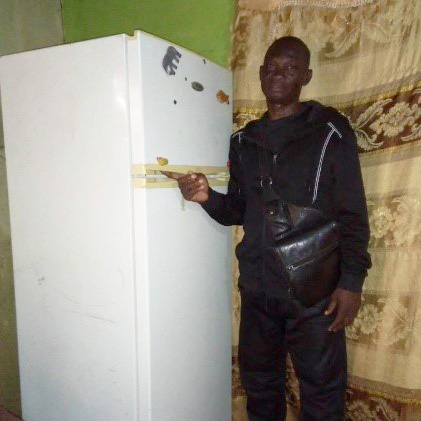Stories of Change

Amani stands next to his soft drink refrigerator.
The CWS Urban Refugee Self-Reliance Program has supported 35 refugees and vulnerable host community members in Tanzania and 800 in South Africa as they become more economically self-reliant.
Goodbye, debts!
“I didn’t meet my family’s basic needs on a daily basis until I started this business. Now I earn an average income of $9 per day!”
These are the words of 56-year-old Amani Twaibu Mwanayumba, a father of two teenage daughters and a refugee from Democratic Republic of Congo living in Tanzania. Before joining the CWS-supported Urban Refugee Self-Reliance Program in Dar es Salaam, Amani didn’t know about income diversification. His livelihood came exclusively from collecting antiques from across Tanzania to sell to larger antique stores in Dar es Salaam, Zanzibar and Arusha.
In his words, “The antiques business environment is so challenging. You have to wait a long time to get customers – sometimes I have to wait for three months or more to get a customer and make a meaningful sale of say $220.”
When Amani did make a sale, the money went right to paying off the debts he owed to his friends. “I was flat broke and had to routinely borrow from friends. Sometimes I even asked my wife to borrow from her friends so we could make ends meet,” he says.
In March, Amani joined a two-day CWS interactive training workshop. He learned about the fundamentals of starting and managing a small business and the basics of marketing for small and micro-enterprises. CWS provides this training for refugees and asylum seekers in Tanzania so that they can move towards economic self-reliance. The effect that it has already had on Amani’s life is undeniable.
Through the workshop and one-on-one meetings with CWS staff, Amani learned about diversifying his household income. Amani invested the money that he had in a refrigerator so that he could enter the business of soft drink vending.
Just a few months later, this steady income has made a huge difference for Amani and his family. “Now I live a happy life,” says Amani. “I kissed my debts goodbye, and now I can afford to support my girls in school and meet our basic needs like food, shelter and clothing.”
